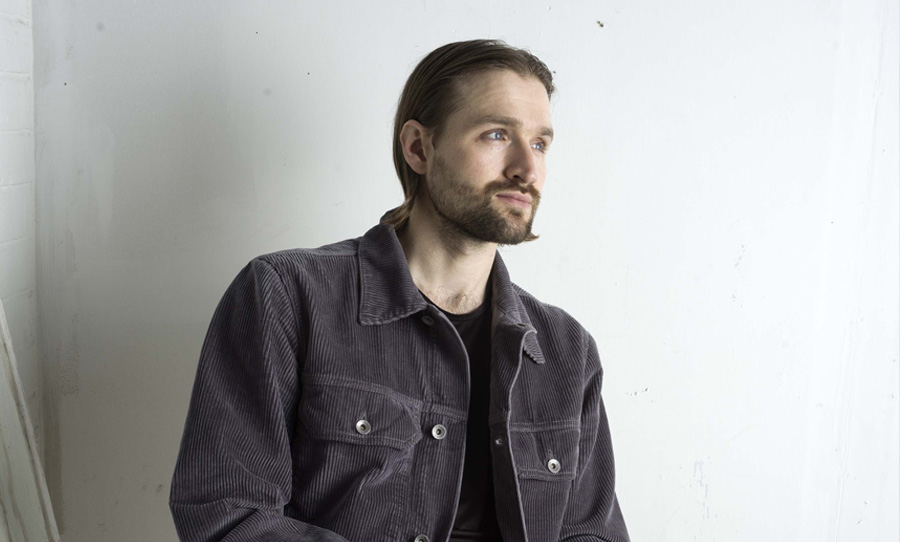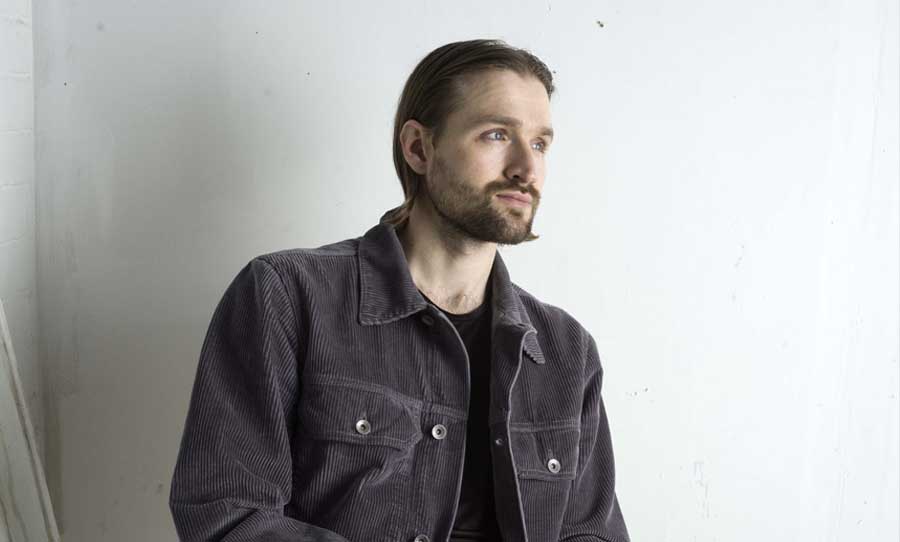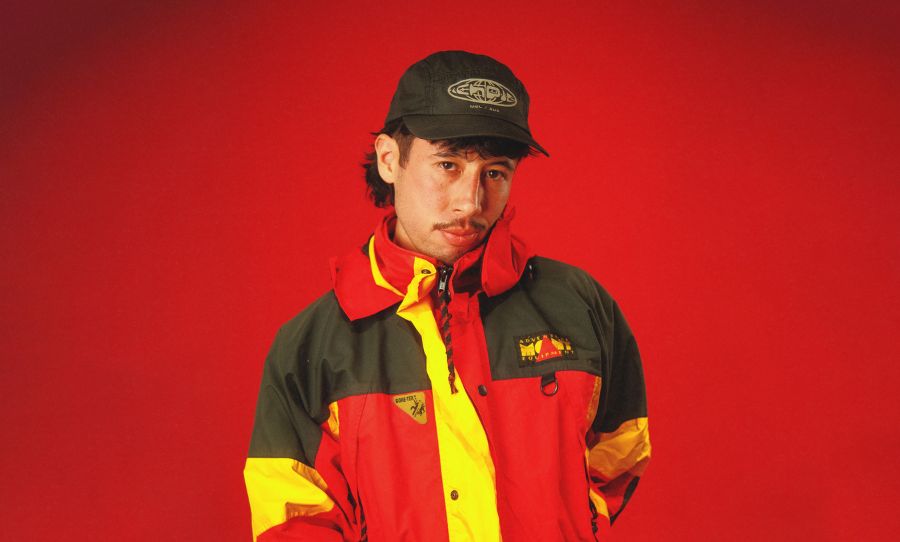Hayden Thorpe is a musician currently based in London, formerly the frontman of acclaimed indie band Wild Beasts. His recent pursuit, however, has been a debut solo album named Diviner, a philosophical, transcendental, and breathtaking body of work.
Sitting down with Hayden at a coffee shop in Sydney, it was striking how profoundly the psyche of his album was reflected in his manner. We spoke at length about how Diviner came to be, his thoughts on life, and why songs exist outside of time.

Universal energy and the link between science and mysticism: we get existential with Hayden Thorpe.
HAPPY: I read you wrote Diviner, the song, on your birthday. Is that true?
HAYDEN: Yeah.
HAPPY: Do you believe in some kind of universal alignment or energy, or anything of that class?
HAYDEN: I think the mythology of today is that we’re in control of our own destinies. The illusion of control is essential to our way of living, but I think if you’re a musician you need to relinquish control in your songs because your currency is thin air. A song exists in the ether, it’s not a quantifiable thing. So I think in some ways songs are your only point of control… songs are a form of divination. So did I think that song was going to arrive for me on that day? Yes I did, because otherwise it wouldn’t have happened. There are no accidents in that sense, you know? Did I sit down at the piano that day with the idea that I would write that song? Maybe in some aspects, yes. I always say songs are the foot soldiers of the subconscious, they go to places you don’t quite know are there.
HAPPY: So it’s a process of understanding?
HAYDEN: I think.
HAPPY: On the point of control, I think part of the creative process, when done right, involves losing some control. Especially in songwriting. After you’ve written something, you’re handing it off to somebody to help you with it… and in the end you’re handing it to an audience.
HAYDEN: I mean again, we’re in a civilisation of ownership. Owning things and owning objects has some kind of emotional fix. I went through a period of my life where everything changed, and the only way to deal with that was having a sense of meant-to-be-ness, but the pieces haven’t always been like that. People love symmetry, but if you look at the stars there’s no ‘belt’ up there, we applied a pattern to it. We love those patterns in the chaos of every day. So that it was my birthday… that probably meant fuck all to the universe, but for me, that became my gift of self.
HAPPY: And that’s enough?
HAYDEN: Yeah, and that’s enough.
HAPPY: Was that the first song you wrote for the album?
HAYDEN: Yes.
HAPPY: So it set the tone? Sonically, emotionally, however?
HAYDEN: I guess it did in that it was a piano song, and the piano is a very earth-bound object. You can’t move the thing, so within a house it becomes something to really plant yourself by. The current moves through you into it, the sequence of notes and the order and mechanics of it are very reassuring – again a pattern. There’s something you can derive from this order, but there is an order, and it’s bigger than you. So I guess I became enchanted with this piano as being my way forward. I bought myself a piano for the record because I knew both the financial investment and the locational investment meant I had to get to work.
HAPPY: I’ve recently looked at getting a piano, and it’s amazing how many people are giving them away for free. But, it’s such a commitment to move.
HAYDEN: A piano in a home is an air purifier. It soaks up the dodgy emotional odours, it does something to a home, you know people exist there. I think every home should have one.
HAPPY: Were there other moments writing the album, aside from the first song, where you felt this energy? Or alignment?
HAYDEN: I guess I felt… as a songwriter, you can write yourself into existence. You’re trying to kind of curate the world around you, you exist in your songs, you’re almost trying to create a world for you to exist in. So I do think you have to have a very acute sense of shape and alignment. If you think about it, songs are the only thing to exist in the past and future simultaneously. To enjoy a song, you need to remember what has just been and anticipate what’s next. It’s the only time where you actually exist with both hands, and that’s what you do with a piano when you sit down with it. You’re present, you’re now. What has gone just went, and what is about to be, you’re about to do. That gives you an uncanny sense of control and you need to summon what’s within.
HAPPY: You mentioned space there… I’ve noticed in the album you work very ethereal concepts like time or love into geometric shapes. You begun answering this just now, but do you compose with space or geometry in mind?
HAYDEN: That’s a nice question, thank you. I believe in the repetition of nature, I believe shapes repeat, and that’s kind of what I work with. It’s hard to describe. Love is a chemical response, love is a molecular alignment.
HAPPY: So it can be a square or a knot, then?
HAYDEN: Yeah… emotions can be so fleeting, and songs can allow you to hold onto them for a little longer. They create shape, but also interestingly, a song can make you feel in love. On a scientific level, the neural pathway is the same, that’s the beautiful thing. If you’re thinking of a song rather than hearing a song and the audio information isn’t there, but it’s existed within you… a link between science and mysticism becomes very apparent. This on a basic level came from spending some time basically alone, just trying to summon some shit in some way, you know? This didn’t come from some geometric higher order, this came from the crises of “what next?”
HAPPY: I want to ask about Leo Abrahams, he’s worked with some of my favourite artists ever. With a producer of that pedigree, when you begin working with them does their previous work start edging into your influences?
HAYDEN: Yes.
HAPPY: So you may not have set out to make a record that sounds like David Byrne or Brian Eno, but working with Abrahams, that begins to creep into your sphere of influence?
HAYDEN: Yeah, willingly too. You have to be open to the intravenous of whatever they’ve come across, whatever’s in their bloodstream. With Leo, it’s the nerve he has, I think the calibre of work he’s done has instilled in him a kind of nerve just to hold you. To reference internally and not externally, because the culture of what’s correct to do is pretty easy to succumb to, and I think with Leo the timelessness of the artists he’s worked with has helped him hold that nerve. But also, production for me is… in another world they wouldn’t be called producers, they’d be called musical problem solvers.
HAPPY: They’re a close relative of the engineer.
HAYDEN: Exactly. The best producers just have the most ingenious repertoire of solutions and that’s the thing, I never ever felt trapped. I never felt that there wasn’t a way out. I also trust him, he’s a good pal, he came and listened to the songs while I was in a dressing gown in the front room, just iPhone demo bits of fluff.
HAPPY: What was the actual recording like this time, was it a short block or dragged out?
HAYDEN: I think everything as a musician is about excruciating waiting followed by sublime moments of release, and that’s what that process was. It felt like an eternity would boil down to a two-minute performance. It was only blocks; Stella from Warpaint did the drums in two days, she hadn’t heard the song before so we played it as she was on the drums. First go was getting to know it, second would be ‘I’ve got something in this’, and third would be the take.
HAPPY: That’s a lot of a trust again.
HAYDEN: It was a lot of trust but then again, nothing good really comes from not trusting people. See moments like that, waiting weeks to get Stella, waiting until she arrived, then she got into the studio and it was realised. I like that. I prefer intuition.
HAPPY: Where did you write the album?
HAYDEN: At home in Northeast London, it was a very home-based album. Music hadn’t existed in my home for quite a long time because I was with a band in studios and rehearsal rooms, and music was always the other, the outside. So it came in, the piano was ten feet from my bed. Once you start to live the cadence of a day with an instrument around you… it doesn’t have to prepare itself for the outside world, it doesn’t have to get dressed, or put on its game face, you know. It does effect the music if you make it at home. It was written from my front room.
HAPPY: And when did you begin writing? I mean, the very first time. In general.
HAYDEN: I remember as a kid I would write songs, since about seven or eight. Like I’d prefer to write songs rather than follow the rules, that’s my first memory. There are songs that I wrote when I was 11 that I can recall now, there’s a song that I wrote when I was 16 that ended up on this record.
HAPPY: Really?
HAYDEN: Spherical Time.
HAPPY: The instrumental? That’s interesting.
HAYDEN: Yeah, this is what I mean… you can come back and pick up bits of yourself.
HAPPY: Was it called Spherical Time when you were 16?
HAYDEN: Funnily enough it was called Star Signs. Spherical Time is just a nod to the fact that songs are non-linear, they don’t exist in time like they’re supposed to. Time works differently in songs, like how much can happen in two minutes of a song? A whole lifetime can happen in some songs. A whole relationship, in a perfect song… a whole marriage can come down to a song. They super-compress time, and they don’t work as earth time does. But because they don’t erode, they don’t decay, they don’t change, actually our mind changes around them. So I never thought that song could end up on a record of mine, it wasn’t even supposed to be half-time, but it happened that I ended up twice my age, half-speeding a song. That makes you start to suspect… are there other forces at play, or am I curating my own narrative?
HAPPY: You could make a case either way.
HAYDEN: Whatever you need to believe to be, whatever you need to be you when you’re being you, you know? So I came to believe that somehow these songs have been conjured out of some external place perhaps. Because why not? Because that suited me.
Diviner is out May 24th via Domino. Grab your copy here.



